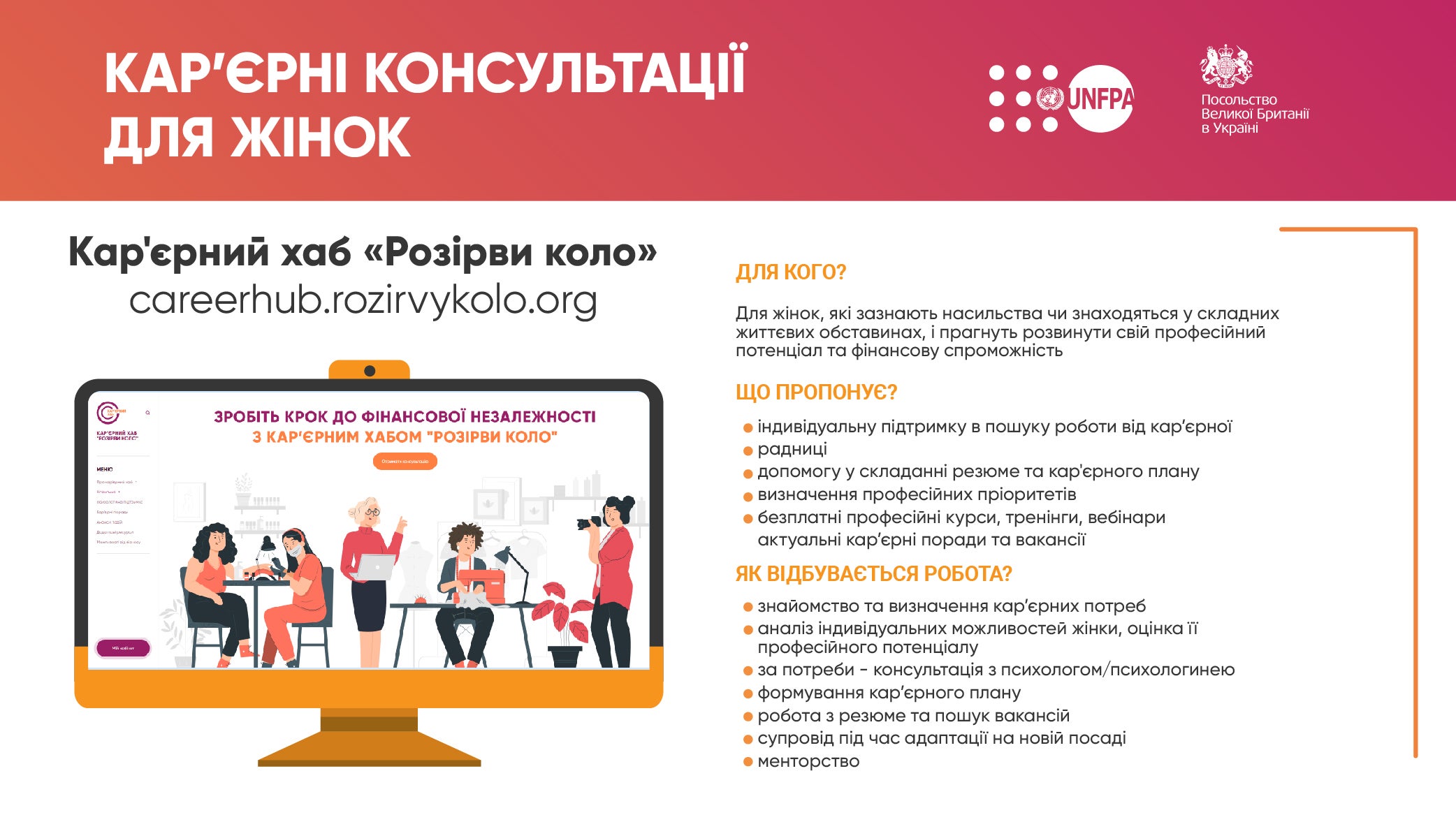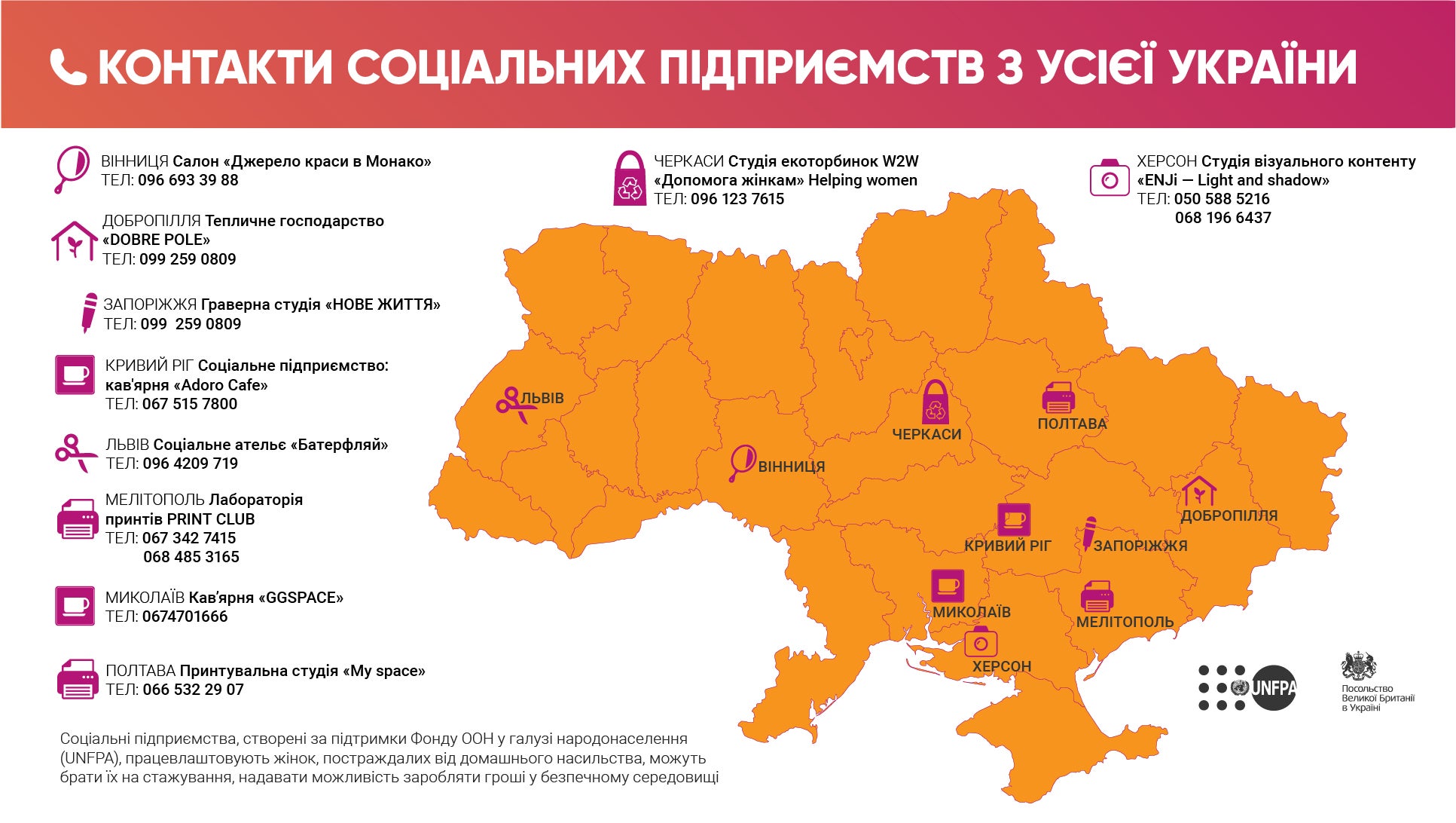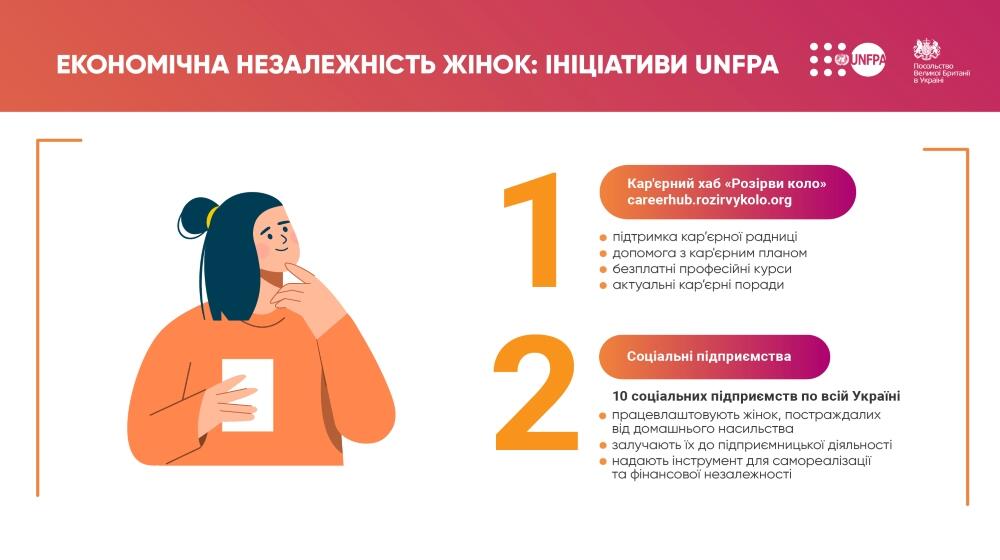The victim’s financial dependence on the abuser often forces her to stay or return to an abusive relationship. To address this issue, the United Nations Population Fund (UNFPA), with the support of the UK Government, has launched the Break the Circle career hub, supports the opening of social enterprises and provides career advice to women.
A 2019 OSCE-led study on violence against women in Ukraine found that 21% of women (more than one in five respondents) suffered from economic violence. This category includes situations where a person is restricted in their rights to decide on a family budget, go shopping on their own or work outside the home. Women themselves have identified this type of violence as a situation where a man controls her spendings or forces her to keep a strict record of expenses. Often women do not believe that they will be helped, do not seek help, are unable to realise their potential and, therefore, break the cycle of violence.
The ability to earn money is the basis of a woman’s economic security, the ability to decide for themselves and build a life as she sees fit, says Anna Tsitsak, a project specialist at the United Nations Population Fund in Ukraine.
Since 2015, the UN Population Fund programme has been working to establish a national system for combating and preventing domestic and gender-based violence in Ukraine. During this time, significant progress has been made in creating a legislative framework, creation of specialised services for survivors, interagency cooperation, as well as raising awareness and changing public attitudes to the problem of violence.”
There are shelters, day centres, crisis rooms for survivors. At the same time, the women who found themselves there did not have the opportunity to provide for themselves, to find a job or start their own business. And, unfortunately, they often returned to their abusers. Therefore, from 2020, we have added a component of developing the economic potential of women to help women gain economic independence.
Its first component is the Break the Circle Career Hub where the project’s career counsellors help women with their professional plans. Women from all over Ukraine can seek advice using the online platform. Career counsellors will answer any questions, offer to meet online or offline, assess needs and help develop a career plan.
All consultations are free and personalised: each woman can see her strengths, overcome obstacles, learn a new trade and more. The career hub provides an opportunity to enrol in professional courses that women can take for free and master a profession, as many of them have never had a formal job.
This is a great opportunity to empower the women who have experienced violence, to make them believe in themselves. Sometimes they need the support of career counsellors and project therapists. We help with both knowledge and resources. But mastering a profession, getting a job does not mean that everything will be fine. There are many barriers that need to be overcome from time to time, which is why this support is so important.
The second component is the creation of social enterprises. There are 10 of them all over Ukraine so far. These companies employ or provide internships to female survivors of domestic violence, provide opportunities to earn money for themselves and their children in a safe environment.
Towards financial independence: career counselling for women from all over Ukraine
The Break the Circle career hub platform helps women who are experiencing violence or difficult life circumstances to develop their professional potential and financial capacity. Here, they can receive individual support in finding a job from a career counsellor, help with a resume and career plans, determine professional priorities; participate in free professional courses, workshops or webinars; learn current career advice or even vacancies.

In addition, women may have legal, mental health issues. Then they are referred to project therapists and NGOs that provide legal support. According to Svitlana Kalinina, Career Counsellor, women who seek their help usually have many professional barriers.
“The first big task is determining the direction of professional development. Women often look for work after a long break—several maternity leaves in a row—and cannot find the direction to move in. They need to learn to present themselves through CVs and interviews to emphasise every professional skill important to the employer, carefully prepare for the interview and pass it, working through all the questions (especially those related to lack of experience, gaps in the CV)”.
It is equally important to have access to professional training courses. If the client does not have a clearly defined professional direction, our project gives her the chance to try herself in different directions, to master the professions needed in the labour market. There are a number of interesting courses for women who, say, want to develop in popular areas such as marketing, HR, SMM. The most popular area is, of course, IT courses. They can also try other professional areas that are in great demand such as hairdressing, tailoring, embroidery.
However, it is often the case that a woman needs ready money, so she prefers a position where she can earn money immediately, sacrificing professional development opportunities. Sometimes girls are not ready to grow: it is a long and difficult process; you start your career basically from scratch, and the salary is appropriate. Then we motivate them to consider career opportunities such as paid internships and training.
It is not easy for those women who live in shelters with small children: they have no childcare options. Pandemic and distance learning is yet another challenge. For example, families have one laptop that children are already using to study, so a woman cannot study herself. These are the issues we are dealing with: providing women with technical means, providing shelters with nannies who will take care of the children.
Some girls find work after one or two meetings. Then there are those we have been working with for a year: they are undergoing various internships, gaining knowledge. There are girls who get a job after completing courses: they are probably the majority. And some apply again because they want a career. We keep up with the success of all our clients and rejoice in the positive changes in their lives, since many women have gone through painful life experiences.
Social enterprises: businesses that help women in difficult circumstances
With funding from the UK government, UNFPA has supported the creation of social enterprises in 10 cities in Ukraine. The first 5 opened in the spring of 2021; the others have recently received funding and plan to launch at the end of the year.

For instance, as part of the project, a visual content studio is already operating in Kherson, a printing studio creating print designs that can be applied to textiles was launched in Poltava, and an aesthetic studio opened in Vinnytsia.
Based on her work experience in the social sphere, Uliana Dorosh, Founder of Butterfly Social Studio in Lviv, has been well aware that female survivors of violence are afraid to leave their abusers because of their financial dependence on them. She decided to create decent working conditions for such women so that they could build a decent future for themselves and their children.
“I dreamed of my own studio since I was a kid; I wanted to be a designer. Childhood hobby became an adult goal, which was embodied in the creation of Butterfly, the first social studio in the Lviv region.”
This is an example of social entrepreneurship, a business whose mission is to solve social problems. In our case, it is the creation of jobs for women who have suffered from domestic violence. The priority is to open opportunities for them to realise their potential, to show that they have all the necessary resources, and are, with the right approach, able to work efficiently and responsibly. We offer training and personal supervisions for the employees of the enterprise. The studio has also become somewhat of a platform for communication for women from socially disadvantaged groups: here they make friends and spend leisure time together.
Currently, the Butterfly Studio team includes 6 such women: domestic violence survivors, mothers with many children, low-income mothers and internally displaced persons. In the summer of 2021, the studio made bed linen for a shelter in Truskavets, home to women and children who have suffered from domestic violence. The Cutting and Tailoring course was recently completed at the studio, and the Knitting Machine course will soon begin, both for female survivors of abuse and violence. Part of the profit is aimed at combating domestic violence in the Lviv region. The funds will also be used to help women in difficult life situations, according to Uliana Dorosh, Founder of the Butterfly Studio.
“Butterfly Social Studio aims to promote the socio-economic well-being of the community by increasing the access of victims of domestic violence to self-development, education, learning a trade and employment, as well as vocational rehabilitation.”
It also aims at the improvement of cooperation between state bodies and civil society institutions in solving the problems of integration of women who find themselves in difficult life circumstances into public life, providing them with equal opportunities in exercising the right to work. In addition, Butterfly plans to continue to promote women’s entrepreneurship.
We also refute the stereotype that women who are in difficult life circumstances cannot create quality, trendy products, start a new fashion trend, meet the demands of the mass consumer. For instance, women’s white shirts became the staple of the studio. I dream that they will see the international and European catwalks of Paris, Milan and New York.
There are social enterprises to be launched at the end of 2021 in a very wide range of areas. These are a craft coffee and confectionery café in Kryvyi Rih, a studio of engraving and laser works in Zaporizhia, a sewing studio in Cherkasy, where victims of gender-based violence with disabilities will work, a new studio of Zshito-Kruto, the sewing company in Melitopol.
Vadym Khryptovych, a social entrepreneur from Dobropillia, has been helping people in difficult life circumstances for a long time. At the moment, he is preparing the launch of the first social enterprise, a greenhouse for growing greens, on the basis of a rehabilitation centre for alcohol and drug addicts and victims of domestic violence.
“At first, I worked with HIV-positive people in Druzhkivka [Donetsk region]. At that time, there was not enough information, and people who found out about their status thought their life was over. The same thing happened in Dobropillia. We opened a rehabilitation centre here on our own and later received financial support from the United Nations Development Programme.”
There are 65 people in the centre at the moment, but not all of them are drug addicts. We are a mining town, but the mines have closed. People lose the opportunity to earn, start drinking, lash out, and the first to suffer is their family, wife and children. So we now have a new direction, women who have suffered from domestic violence.
The idea of a social enterprise arose a long time ago. When you do this work, you are constantly looking for funding: you need to feed people, pay for utilities, etc. But until recently, there were no similar projects. So when my partner and I saw the UNFPA initiative to create social enterprises, we decided to open a greenhouse.
Firstly, food is always needed. Secondly, we saw that there are obviously not enough greens in the shops of the city and its suburbs, especially in winter. We noticed that the microgreen trend is gaining momentum. That’s how it all started.
Our company will employ several women who have undergone rehabilitation. In the future, we plan to buy a couple of large greenhouses and open them on the basis of a new rehabilitation centre. The City Executive Committee has provided us with premises for this, and now we are making repairs.
Social enterprises created with the support of UNFPA have already helped more than 180 people to acquire new professional skills as part of the career support programme by the Break the Circle career hub. This is an example of how caring and interesting initiatives work with people who have suffered from gender-based violence and help to counteract it in their cities.


